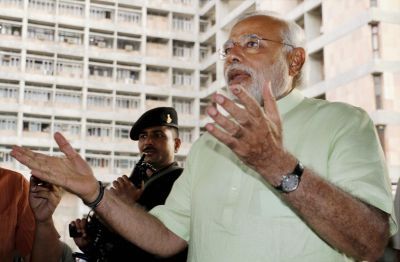 Prime Minister Narendra Modi on Saturday said that vague laws that lend themselves to different interpretations are the foremost reason for pendency of cases in courts.
Prime Minister Narendra Modi on Saturday said that vague laws that lend themselves to different interpretations are the foremost reason for pendency of cases in courts.
"At the root of pendency of cases are laws that have 10 interpretations. There is shortage of quality manpower for drafting laws," he said while addressing the valedictory function of the sesquicentennial celebration of the Advocates Association of Western India.
Seeking assistance of the legal professionals in drafting statutes, Modi said, "I have suggested that draft laws be posted online for legal opinion so that good and effective laws can be made with minimum of grey areas. That will effectively bring down pendency of cases in courts. In this, bar associations can be of great help."
He suggested that legal educational institutions should include a subject dealing with improvement of law drafting skill in their curriculum.
"It is difficult to get justice in the jungle of laws. I had said I will consider myself successful if I am able to finish one (outdated) law everyday in my tenure of five years. I have completed my quota of five years in just a few months by doing away with 1,700 irrelevant acts," the prime minister said.
Maintaining that the world had great expectations from India, Modi said one of the reasons for it was its independent legal system.
"The world's focus is on India....in the last few months their attraction for India has grown, they look at us with great expectation and the reason is their faith in the Indian legal system.
"They know if something goes wrong, they will get justice and so they invest here. They know the legal system, the judiciary is independent. Good governance is not enough, the legal system has played a role in raising India's stock globally," he said.
Maintaining that the emphasis today was more on quick justice, the prime minister underscored the need for quality justice for the people.
"Yes, we talk about quick justice but how can we focus on quality justice. Here lawyers play a very important role," he said adding that this would satisfy both the winner and the loser in a litigation and enhance institutional credibility of the judiciary.
"As the trust in institutions erodes, so do the institutions. Institutional credibility is important," he said.
Recalling the role played by those in the legal profession and from the sphere of education in the freedom struggle, he said they contributed a lot to it.
"The foot soldiers of the freedom movement had the assurance that if they have any problem the legal minds in the struggle will help them out," he said.
About the glorious history of the Advocates Association of Western India, Modi said its present members were proud inheritors of the legacy of Mahatma Gandhi and Sardar Patel.
The pime minister stressed on the need for advocates to specialise, particularly in emerging areas of litigation such as international law and cyber crime. Acquaintance with
forensic science is now a must for those associated with the legal profession, he said.
Union Law Minister Sadanand Gowda said the legal professionals were the watchdogs of democracy.
There were three stakeholders in the administration of Justice -- judiciary, the bar and government. All the three have to work together to ensure speedy disposal of cases. In this regard, lawyers have to cooperate with the judges, he said.
The government was also in the process of introducing reforms in the judicial system for speedy disposal of cases, including setting up commercial courts for business disputes and according priority to the alternative disputes redressal mechanism by amending existing laws, he added.
India was fast becoming a hub of international arbitration and this would also generate employment and increase revenue for the lawyers, the minister said.
The government had so far repealed 36 Acts, amended 750 and introduced 950 Bills for bringing about changes in the judicial system, Gowda said. Maharashtra Chief Minister Devendra Fadnavis assured that he would consider the demand of the Advocates Association of Western India for a land at Bandra Kurla complex here to house the Bombay high court as the existing building in South Mumbai could not accommodate all the courts.
Chief Justice of Bombay high court Mohit Shah said that AAWI had a glorious past as it had produced stalwarts like Mahatma Gandhi, Sardar Vallabhbhai Patel and Dr B R Ambedkar.
AAWI members were dedicated to the legal profession and had never resorted to strike or indulged in any kind of protests to get their demands fulfilled, he noted.
Justice S A Bobade, judge of the Supreme Court, urged the members of AAWI to cherish the past and ensure that the institutions maintains its glory in the years to come.











 © 2025
© 2025